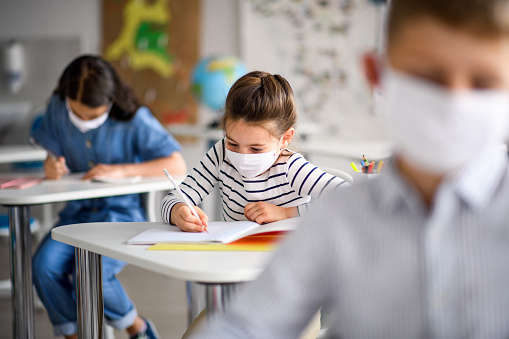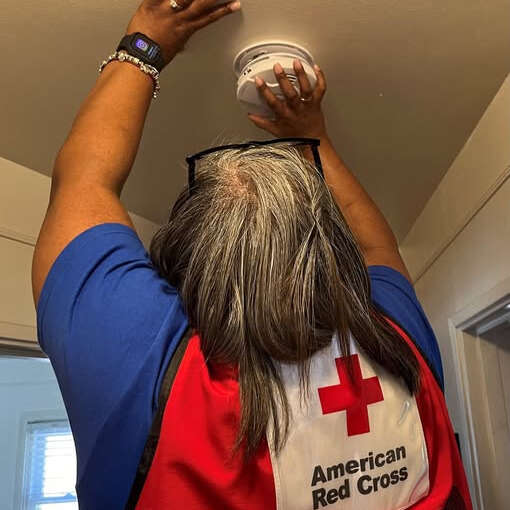
A new survey shows that pandemic learning loss has impacted a number of students who are now in upper elementary school.
(www.edweek.org - Press Release survey) - by Madeline Will, who is a reporter for Education Week who covers the teaching profession.
Young students are struggling with fine motor skills, like using scissors and pencils, and social-emotional capabilities, such as following instructions and sharing, teachers report.
Strong majorities of preK-3 teachers said these tasks and skills were more, or much more, challenging for children this school year than they were for kids of the same age five years ago, according to the Education Week State of Teaching survey. Experts say this is likely in part a function of the upheaval caused by the pandemic—and that even students who weren’t in grade school during the height of school closures are still experiencing the lingering effects.
“These fundamental skills that seem so basic are actually really important to [children’s] overall development and growth,” said Amanda Fellner, a lecturer in the early childhood education program at Teachers College, Columbia University, and a faculty co-director of the Rita Gold Early Childhood Center there. “How are we supporting teachers on this? How are we ensuring that they are able to focus on the things that are important and making sure those fundamental skills are being built?”
The State of Teaching survey polled a nationally representative sample of 1,500 teachers in the fall, but only teachers who teach grades pre-K-3 answered this question.
Social-emotional skills—listening and following directions and sharing, cooperating with others, and taking turns—topped the list of the tasks that children today are having more trouble with than their peers five years ago.
Most teachers also identified students’ ability to use scissors, crayons, pencils, and pens and tie their shoes as skills that are more challenging now than they used to be.
The results align with some of what the National Institute for Early Education Research at Rutgers University has found in parent surveys on their young children’s learning and development. The organization has surveyed a national sample of parents to children ages 3 to 5 who are not yet in kindergarten six times since spring 2020, with the last survey conducted in December.
While some social and emotional problems have declined slightly since the height of the pandemic, the share of parents who reported that problems with pro-social behaviors—which include skills like learning how to make friends, sharing, and getting along with peers—has increased. Twenty-eight percent of parents indicated those skills were an issue in the most recent survey.
There are several potential reasons why young students’ social and fine motor skills are lagging, said Steven Barnett, the senior co-director of NIEER.
The disruption of the pandemic on schools is one, he said. Preschool and kindergarten enrollment declined during the height of the pandemic. And even if children were enrolled in preschool or kindergarten during 2020 or 2021, they might have experienced remote learning instead due to school closures.
That means that students who are in early elementary grades now might have missed out on learning how to interact with their peers in a classroom setting. Students with disabilities also might not have gotten early intervention services, Barnett said.
Another possible reason is that young children’s screen time has increased in recent years. Research has shown that screen time shortens attention spans and leads to difficulty focusing. Children’s reliance on screens might mean they’re going on fewer play dates or spending less time using crayons or scissors, Barnett added.
“When you see kids trying to swipe books,” like they’re interacting on a tablet or a cellphone, “you get a sense that maybe some of the traditional tools aren’t as familiar,” he said.
“As a teacher, if I feel that none of the children are listening, I can imagine that that would be a very draining experience on a daily basis in the classroom,” said Sarah Duer, the director of the Hollingworth Preschool at Teachers College.
School leaders need to make sure teachers have the support they need to catch students up on the norms and expectations of the classroom, she said.
“A teacher with a lot of emotional bandwidth to support children with these very foundational, very essential skills is going to need a lot of time to develop that resilience and a lot of support,” Duer said.
This is also work that should be done in connection with students’ caretakers, she said.
“Families’ needs are always changing. And they’re certainly different than they were five years ago,” she said. “We have to be flexible, responsive, and adaptive to the changing needs.”

 4/18/25 - List of Easter Events for the Kids
4/18/25 - List of Easter Events for the Kids
 04/15/25 - Red Cross Going Door to Door This Month
04/15/25 - Red Cross Going Door to Door This Month
 11/06/24 - ELECTION 2024 - ELECTION RESULTS
11/06/24 - ELECTION 2024 - ELECTION RESULTS
 8/15/24 - Groundbreaking For New Children's Rehab Hospital
8/15/24 - Groundbreaking For New Children's Rehab Hospital


